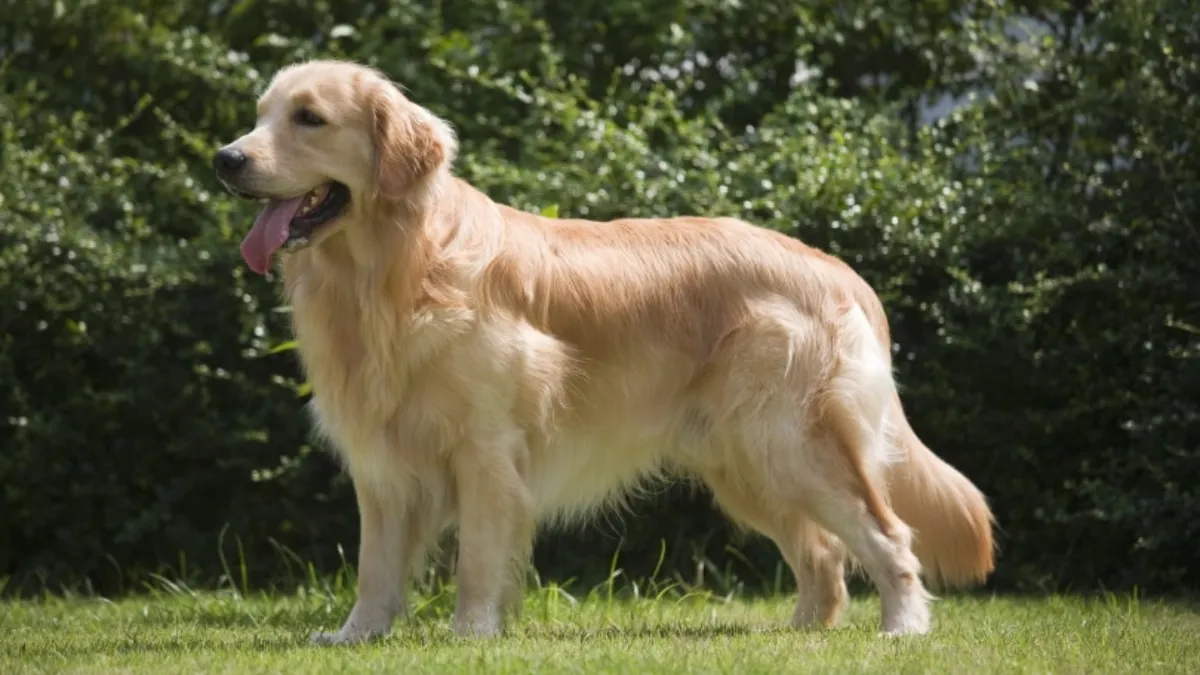Golden Retrievers are one of the most beloved dog breeds in the world. They are known for their friendly personalities, loyalty, and intelligence. However, for some people, owning a Golden Retriever may not be possible due to allergies. This raises the question: are Golden Retrievers hypoallergenic?

Unfortunately, the answer is no. Golden Retrievers are not hypoallergenic. This is because they shed a lot of hair, which can trigger allergies in some people. Additionally, they produce dander, which is a common allergen. However, it is important to note that no dog breed is completely hypoallergenic.
Despite not being hypoallergenic, Golden Retrievers are still a great choice for many families. They are gentle with children, easy to train, and make great companions. For those who suffer from allergies but still want to own a Golden Retriever, some steps can be taken to reduce the risk of an allergic reaction. These include regular grooming, vacuuming, and keeping the dog out of certain areas of the house.
Understanding Allergies and Hypoallergenic Traits
Allergic reactions in dogs are caused by a protein found in their dander, saliva, and urine. When a person with a dog allergy comes into contact with these proteins, their immune system produces antibodies that trigger the release of histamine, causing symptoms like sneezing, itching, and watery eyes.
Some dog breeds are marketed as hypoallergenic, which means they are less likely to cause allergic reactions. However, there is no such thing as a completely hypoallergenic dog.
What Makes a Dog Hypoallergenic?
Hypoallergenic dogs are those that produce fewer allergens than other breeds. They are often characterized by a non-shedding coat, which means they shed less dander and fur. This is because dander, which is made up of tiny flakes of skin, is the main culprit of dog allergies.
Hypoallergenic dogs also produce less saliva, which contains a protein that can cause allergic reactions. However, it is important to note that while hypoallergenic dogs may produce fewer allergens, they still produce them. Therefore, it is still possible for a person with a dog allergy to react to a hypoallergenic dog.

Common Allergens in Dogs
Aside from dander and saliva, there are other common allergens in dogs that can trigger an allergic reaction. These include:
- Urine: Dog urine contains proteins that can cause an allergic reaction in some people.
- Fur: While fur itself is not an allergen, it can trap other allergens like dander and pollen, making it a potential trigger for allergies.
- Protein: There are several proteins found in dog saliva, dander, and urine that can cause an allergic reaction.
In conclusion, while there is no such thing as a completely hypoallergenic dog, some breeds are less likely to cause allergic reactions. However, it is important to note that individual dogs may still produce allergens that can cause a reaction in some people.
Golden Retrievers and Allergens
Golden Retrievers are a popular breed of dog known for their friendly and affectionate nature. However, many people are left wondering if they are hypoallergenic. In this section, we will explore shedding and dander production, as well as the coat characteristics of Golden Retrievers to determine if they are hypoallergenic.
Shedding and Dander Production
Golden Retrievers are known for their double coat, which means they have two layers of fur. The outer layer is made up of long, straight hair, while the inner layer is shorter and softer. This double coat helps to protect them from the elements, but it also means that they shed a lot.
When a dog sheds, they lose fur and skin cells, which can trigger allergies in some people. Golden Retrievers are no exception, as they shed quite a bit throughout the year. In addition, they also produce dander, which is tiny flakes of skin that can also trigger allergies.
Coat Characteristics of Golden Retrievers
The coat of a Golden Retriever is thick and luxurious, which makes it a popular choice for those who want a dog with a beautiful coat. However, this also means that they require regular grooming to keep their coat in good condition.
Because of their double coat, Golden Retrievers shed a lot, which can be a problem for those with allergies. However, regular grooming can help to reduce shedding and dander production. Brushing their coat regularly can help to remove loose fur and dead skin cells, which can reduce the amount of allergens in the air.
In conclusion, while Golden Retrievers are not hypoallergenic, regular grooming can help to reduce shedding and dander production. If you are considering getting a Golden Retriever and are concerned about allergies, it is important to spend time with the dog before deciding to see if you react.

Managing Allergies for Golden Retriever Owners
Golden Retrievers are not hypoallergenic, which means that they can cause allergic reactions in some people. However, there are ways to manage allergies for Golden Retriever owners. This section will cover some of the most effective methods for reducing allergens and minimizing allergic reactions.
Grooming and Bathing Routines
One of the most important things that Golden Retriever owners can do to manage allergies is to establish a regular grooming and bathing routine. This includes brushing the dog's coat daily to remove loose hair and dander, as well as bathing the dog every four to six weeks.
When bathing a Golden Retriever, it is important to use a hypoallergenic shampoo that is specifically designed for dogs. This will help to remove allergens from the dog's coat and skin, reducing the amount of dander and other allergens that are present in the home.
Environmental Controls and Cleaning
In addition to regular grooming and bathing, there are several other environmental controls and cleaning measures that can help manage allergies for Golden Retriever owners. These include:
- Using an air filter: An air filter can help to remove allergens from the air, reducing the amount of dander and other allergens that are present in the home.
- Vacuuming regularly: Vacuuming can help to remove allergens from carpets and upholstery, reducing the amount of dander and other allergens that are present in the home.
- Washing bedding regularly: Washing bedding, including the dog's bedding, can help to remove allergens from the home.
- Keeping the home clean: Regular cleaning can help to reduce the amount of allergens that are present in the home.
Medical Interventions and Allergy Treatments
For some people, managing allergies for Golden Retriever owners may require medical interventions and allergy treatments. These may include:
- Antihistamines: Antihistamines can help reduce allergic reactions by blocking the effects of histamines, which are chemicals that are released by the body in response to allergens.
- Immunotherapy: Immunotherapy, also known as allergy shots, can help to desensitize the body to allergens over time, reducing the severity of allergic reactions.
- Other allergy treatments: Other allergy treatments, such as nasal sprays and eye drops, may also be effective in managing allergies for Golden Retriever owners.
By following these tips and using these methods, Golden Retriever owners can effectively manage allergies and enjoy the company of their furry friend without suffering from allergic reactions.
Comparing Golden Retrievers to Other Breeds
Hypoallergenic Dog Breeds
When it comes to hypoallergenic dog breeds, Golden Retrievers are not the first breed that comes to mind. No dog breed can be completely hypoallergenic as all dogs produce allergens to some degree. However, some breeds produce fewer allergens than others, making them a better choice for allergy sufferers.
Poodle is a breed that is often considered hypoallergenic due to their non-shedding coat. They produce less dander and saliva than other breeds, making them a good choice for people with allergies. Bichon Frise and Schnauzer are also breeds that are often recommended for allergy sufferers.

Breeds with Similar Allergen Profiles
Labrador Retrievers are often compared to Golden Retrievers due to their similar appearance and temperament. However, when it comes to allergen profiles, Labradors produce more dander and saliva than Golden Retrievers. This means that they may not be the best choice for people with allergies.
It is important to note that individual dogs within a breed can vary in their allergen production. It is recommended that allergy sufferers spend time with a dog before adopting to see if they react. Additionally, regular grooming and cleaning can help reduce allergens in the home.
Crossbreeds and Allergen Reduction
When it comes to hypoallergenic dogs, many people turn to crossbreeds as a potential solution. Crossbreeding a Golden Retriever with a hypoallergenic dog breed can potentially result in offspring that produce fewer allergens, making them a better fit for those with allergies.
Goldendoodle and Other Golden Retriever Mixes
One popular crossbreed is the Goldendoodle, a mix between a Golden Retriever and a Poodle. Poodles are known for being hypoallergenic, and so the hope is that this trait will carry over to the Goldendoodle. However, it's important to note that not all Goldendoodles will be hypoallergenic, as genetics can be unpredictable.
Other Golden Retriever mixes that may have hypoallergenic qualities include the Golden Retriever-Labrador Retriever mix and the Golden Retriever-Irish Water Spaniel mix. Again, it's important to remember that there is no guarantee that these mixes will be hypoallergenic.
It's also worth noting that not all hypoallergenic dog breeds are created equal. While Poodles are often cited as a hypoallergenic breed, other breeds such as the Bichon Frise and the Chinese Crested may also be good options for those with allergies.
In conclusion, crossbreeding a Golden Retriever with a hypoallergenic dog breed may potentially result in offspring that produce fewer allergens. However, it's important to remember that genetics can be unpredictable and there is no guarantee that a crossbreed will be hypoallergenic. It's always best to spend time with a dog before bringing them into your home to see if you have an allergic reaction.
Lifestyle Considerations for Allergic Owners
Allergic owners who are considering bringing a Golden Retriever into their home should take some lifestyle considerations into account. While Golden Retrievers are not hypoallergenic, there are still ways to make living with them more manageable.
Choosing the Right Breed for Your Home
Before bringing a Golden Retriever into your home, it is important to consider whether you or anyone in your household has allergies. While no breed is completely hypoallergenic, some breeds are less likely to cause allergic reactions. For example, Poodles and Bichon Frises are known for being hypoallergenic.
Living with a Golden Retriever: Precautions and Tips
If you do decide to bring a Golden Retriever into your home, some precautions and tips can help make living with them more manageable. Here are some things to keep in mind:
- Keep your home clean: Regular cleaning can help reduce the amount of pet dander in your home. This includes vacuuming carpets and furniture, washing bedding, and dusting regularly.
- Use air filters: Air filters can help remove pet dander from the air. Look for filters that are specifically designed for pet allergies.
- Bathe your dog regularly: Regular baths can help reduce the amount of pet dander on your dog's fur.
- Use allergy medication: Over-the-counter allergy medication can help reduce allergy symptoms.
- Train your dog not to jump on furniture: This can help reduce the amount of pet dander on your furniture.
- Consider keeping your dog out of certain areas of your home: For example, you may want to keep your dog out of your bedroom to reduce the amount of pet dander in that area.
By following these precautions and tips, allergic owners can still enjoy the companionship of a Golden Retriever while managing their allergies.
Myths and Misconceptions

The Hypoallergenic Myth of Golden Retrievers
There is a common misconception that golden retrievers are hypoallergenic dogs. However, this is not entirely true. While some people may have less of an allergic reaction to golden retrievers than other breeds, they are not completely hypoallergenic.
One of the reasons golden retrievers are often thought to be hypoallergenic is because they have a reputation for shedding less than other breeds. However, this is not always the case. While some golden retrievers may shed less than others, they still shed and produce dander, which is the primary cause of allergic reactions.
Another myth surrounding golden retrievers and allergies is that they produce less dander than other breeds. However, this is not true either. All dogs produce dander, which is made up of tiny flakes of skin that can trigger allergic reactions in some people.
It's important to note that there is no such thing as a completely hypoallergenic dog breed. While some breeds may produce less dander or shed less than others, there is no guarantee that an individual with allergies will not react to a particular breed.
If someone is considering getting a dog and has allergies, it's important to consult with an allergist to determine which breeds may be better suited for their individual needs. It's also important to note that while some breeds may be less likely to trigger allergies, individual dogs within that breed may still cause a reaction.
In summary, while golden retrievers may shed less and produce less dander than some other breeds, they are not completely hypoallergenic. It's important to consult with an allergist and do research before getting a dog to ensure that the individual's allergies are taken into consideration.

Conclusion
In conclusion, despite the popularity of golden retrievers, they are not deemed hypoallergenic. The breed's frequent shedding, owing to its long, thick coat, can potentially trigger allergies in some individuals. It's crucial to recognize that not everyone with allergies will necessarily be affected by golden retrievers. So, when asking "Are Golden Retrievers Hypoallergenic?" it's essential to consider individual sensitivities and potential allergic reactions.
It is recommended that individuals with allergies spend some time around golden retrievers before bringing one into their home to see if they experience any symptoms. Additionally, regular grooming and bathing can help reduce shedding and dander, which can also help alleviate allergy symptoms.
Overall, while golden retrievers may not be hypoallergenic, they can still make great pets for those who do not have allergies or are not affected by their shedding. It is important to consider all factors when choosing a pet, including allergies, lifestyle, and personality.




